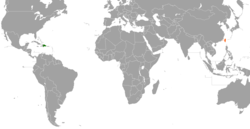 | |
Dominican Republic | Taiwan |
|---|---|

Dominican Republic-Taiwan relations are the bilateral relations between the Dominican Republic and Republic of China, now commonly known as Taiwan. The two countries maintained official relations from 1944 to 2018. [1] At the time it broke relations, it was the largest economy amongst the 19 UN member states to have had fully recognized the Republic of China as the sole legitimate representative of all of China.
